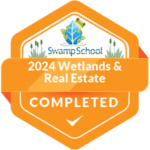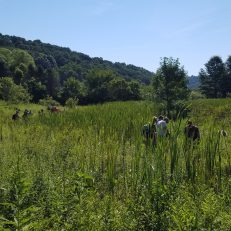Product Description
Live and In-Person
Unlock the complexities of wetlands within the North Carolina real estate landscape with our comprehensive 4-hour online masterclass, specifically tailored for real estate professionals. This course delves into the integral role that wetlands play in the ecological fabric of the region and the significant impact they have on property values, development potential, and regulatory compliance. Join us to gain a competitive edge in the marketplace by understanding the intricate balance between environmental stewardship and real estate development.
Class Location:
The Swamp School
315 S. Salem St. Suite 310
Apex, NC 27502
Key Features:
- Expert-Led Sessions: Engage with leading environmental scientists and real estate experts specializing in North Carolina’s unique wetland ecosystems and property market dynamics.
- Interactive Learning Environment: Experience a state-of-the-art classroom environment that facilitates live interaction, Q&A sessions, and real-time case study analyses.
- In-Depth Regulatory Guidance: Receive up-to-date information on state and federal wetland regulations, including the Clean Water Act and state-specific guidelines impacting land use and development in North Carolina.
- Valuation Techniques: Learn how to assess and communicate the impact of wetland proximity and health on property valuation, using advanced appraisal methods and market analysis.
- Risk Management Strategies: Understand the risks associated with wetland properties, from flooding to insurance implications, and how to navigate them effectively.
- Sustainable Development Practices: Explore how to integrate sustainable development practices into projects that align with wetland conservation efforts, enhancing property value and environmental outcomes.
- Comprehensive Resource Materials: Gain access to a wealth of resources, including regulatory documents, valuation tools, and ecological reports that can serve as a reference in your professional practice.
What You Will Learn:
- The Ecology of Wetlands: An overview of North Carolina’s wetland types, functions, and the ecological benefits they provide.
- Wetland Laws and Regulations: A detailed breakdown of the legal framework governing wetlands in North Carolina and how it affects real estate.
- Impacts on Property Values: Insights into how wetlands can both positively and negatively influence property values and marketability.
- Navigating Development Challenges: Strategies for successful development near wetlands that comply with environmental regulations while maximizing property potential.
- Case Studies: Real-world examples of North Carolina properties that illustrate the complexities and solutions associated with wetland-related real estate transactions.
- Future Trends: An analysis of emerging trends in wetland conservation and real estate, preparing you for future market shifts.
Who Should Enroll:
This course is ideal for real estate agents, brokers, appraisers, developers, and anyone involved in land acquisition, management, or development in North Carolina. Whether you are looking to refine your expertise for client advisory, stay ahead of regulatory changes, or optimize property investments, this masterclass equips you with essential knowledge and skills.
Certification: Upon completion of the course, participants will receive a Certificate of Completion, demonstrating their enhanced understanding of North Carolina wetlands in the context of real estate.
Enroll now and bridge the gap between real estate prowess and environmental consciousness in one of the nation’s most diverse ecological landscapes.
The Swamp School is an established environmental compliance training school. We teach thousands of environmental professionals annually on various wetland related topics. We are pleased to also be a North Carolina Real Estate Commission (NCREC) Certified education provider (#1624).
The class is approved for 4 Continuing Education NCREC elective credits that can count towards your North Carolina Real Estate License renewal. The NCREC approved course number is: 1972.
NCREC Education Provider #: 1624
NCREC Approved Course #: 1972
Important: NCREC requires that licensed Real Estate brokers review and confirm acceptance of the Swamp School’s Policies and Procedures Disclosure (PPD) before they purchase this class. A copy of the Swamp School’s NCREC approved PPD can be downloaded HERE. We will ask you to send a signed receipt of the PPD at the start of the class. The PPD is also included in our school terms and conditions.
Technical Support
If you need help with the class please start a chat or give us a call during normal business hours (M-F, 9-4 ET). After hours support requests will be addressed the next business day.
Class Format
Participants gather at the Swamp School’s office in Apex, NC, a hub for environmental education and wetland conservation. They are greeted by the instructors and given an overview of the day’s agenda.
Q&A Sessions
The class concludes with a question-and-answer session, allowing participants to seek clarification on any topics covered during the workshop. Instructors also provide additional resources for further learning and encourage participants to stay engaged in wetland conservation efforts.
Feedback and Evaluation
Participants are invited to provide feedback on the workshop, including suggestions for improvement and topics they would like to see covered in future classes. This input helps the Swamp School continually refine and enhance its educational offerings.
Networking and Continued Engagement
Participants are encouraged to stay connected with the Swamp School and fellow classmates through online forums, social media groups, and future events. This networking opportunity fosters a sense of community and enables ongoing collaboration in wetland conservation efforts.
Wetlands and Real Estate (In-Person) Syllabus
NCREC Course Number: 1972
NCREC Provider Number: 1624
Elective Credit Hours: 4 CE Hours
Course Description
The Swamp School’s Wetlands and Real Estate course, part of the North Carolina Real Estate Commission’s CE Elective program, will be conducted in-person to provide an immersive learning experience regarding the real estate implications of wetland properties. Through interactive sessions, participants will delve into wetland identification methods, wetland laws, permit requirements, and wetland mitigation opportunities for landowners. Additionally, recent Supreme Court rulings concerning wetlands and their implications on Federal and State regulations will be thoroughly discussed.
The course is structured to offer training within a classroom setting, allowing for real-time engagement and interaction among participants. The Swamp School is an approved Education Provider for the North Carolina Real Estate Commission.
Course Requirements and Materials
Students are expected to actively participate during in-person sessions. There will be no formal assignments; however, quizzes will be presented in a Kahoot! format. Students will engage in Kahoot! quizzes during class sessions to assess their understanding of the material covered.
During Kahoot! quizzes, students will be required to adhere to proctoring guidelines. In-person proctoring will be implemented to maintain academic integrity. Instructors will provide necessary instructions and assistance during assessments.
Students are expected to conduct themselves professionally throughout the course. Disruptive behavior such as talking out of turn, using electronic devices for unrelated activities, or engaging in any conduct that distracts from the learning environment will not be tolerated and may result in dismissal from the class.
Instructor Contact
Instructors will be available for direct contact within the classroom setting. Participants can communicate with instructors via in-person interactions or through designated communication channels established within the classroom environment.
Wetlands and real estate values have a complex relationship, and several factors need to be considered when assessing the impact of wetlands on property values. Here’s an overview of how wetlands can affect real estate:
Positive Impacts on Real Estate Values
- Aesthetic and Recreational Value: Properties adjacent to wetlands can have increased value due to the natural beauty and recreational opportunities they provide, such as bird watching, fishing, and hiking.
- Biodiversity and Ecosystem Services: Wetlands contribute to biodiversity and provide valuable ecosystem services such as water purification, flood control, and carbon sequestration, which can be a selling point for environmentally conscious buyers.
- Exclusivity and Privacy: Wetlands can offer natural buffers to development, providing a sense of privacy and exclusivity for nearby properties.
- Rarity and Conservation Status: Properties that include or abut protected wetlands might be more valuable due to their unique status and the limited availability of such features.
Negative Impacts on Real Estate Values
- Regulatory Restrictions: Wetlands are often protected by regulations that can restrict development and land use, potentially reducing property values due to the limitations placed on property owners.
- Risk of Flooding: Properties near wetlands may be at a higher risk of flooding, which can lead to increased insurance costs and a decrease in property value.
- Pest Issues: Wetlands can be a habitat for pests such as mosquitoes, which can be a deterrent for some buyers and negatively affect property values.
- Maintenance Costs: The presence of a wetland may increase the cost of land maintenance for property owners, due to the need for specialized landscaping or management of invasive species.
Market Perceptions and Trends
The influence of wetlands on real estate values can also depend on market perceptions and trends. In some markets, the presence of wetlands is highly valued and can significantly increase property values. In others, potential buyers may see them as a liability.
Regulatory and Legal Considerations
Real estate values can be significantly affected by the regulatory environment regarding wetlands. In many countries, there are strict regulations on the use and development of wetland areas. For example, in the United States, the Clean Water Act can impose restrictions on development near wetlands, impacting property values either through direct regulation or through the permitting process.
Economic Studies and Assessments
Numerous economic studies have sought to quantify the impact of wetlands on adjacent property values, with mixed results. Some have found that proximity to wetlands can either increase or decrease property values depending on the type of wetland and the socio-economic context of the area. The specific characteristics of the wetland (e.g., whether it’s a marsh, swamp, bog, or fen) and the quality of the wetland environment can also play a role.
Conservation and Development Balance
The balance between conservation and development is key in determining the impact of wetlands on real estate values. Sustainable development practices that protect wetlands while allowing for responsible use of nearby lands can lead to a positive relationship between wetland conservation and property values.
Final Considerations
- Local Context: The impact of wetlands on property values can vary greatly depending on local environmental, economic, and regulatory contexts.
- Future Changes: Climate change and evolving regulations may alter the relationship between wetlands and property values over time.
- Long-Term Value: Some investors and homeowners place a long-term value on ecosystem sustainability and resilience, potentially outweighing short-term valuation concerns.
In summary, the relationship between wetlands and real estate values is multifaceted and can vary widely. Those considering the purchase or sale of properties near wetlands should consult with local experts, including real estate agents, ecologists, and land-use planners, to understand the specific impacts on property value in their area.

 You can earn this badge and add it to your LinkedIn or Facebook profile!
You can earn this badge and add it to your LinkedIn or Facebook profile!




